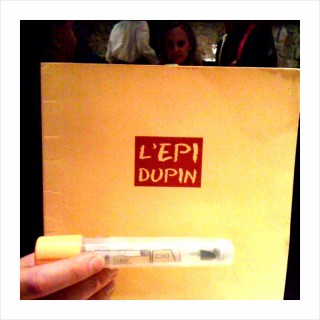 My EpiPen at L’Epi Dupin – A restaurant in Paris.
My EpiPen at L’Epi Dupin – A restaurant in Paris.
Traveling when one has food allergies can be a daunting prospect. But that shouldn’t stop anyone from getting on a plane to destinations unknown. A few years ago I developed serious life-threatening food allergies to certain types of shellfish. And while I am not a doctor, after consulting my internist and allergy specialist, I have my travel system down pat. I never gave it much thought until I was recently asked for some advice on how I manage my allergies while traveling. Erin, a friend of mine from high school, introduced me to her friend, Julie, who was planning a big family trip to Europe on summer holidays for the first time. She needed some guidance, since one of her children has severe food allergies, and I was more than happy to oblige.
Spelling out my system for them was helpful for me and I hope it will be useful for my fellow travelers with food allergies. With that in mind, Julie has graciously agreed to let me share our dialogue.
And it always goes without saying, if you have a serious allergy please consult with your physician before traveling abroad to make sure you are as prepared as possible.
Forwarded conversation
Subject: Making connections
————————
From: Julie
To: Jen
Jen,
I am Erin’s aforementioned friend. I have an 8-year old son who has anaphylactic allergies to dairy and peanuts. We will be traveling to Europe this summer as a family – specifically England, France, Germany, Liechtenstein and Switzerland.
I only speak a smattering of Spanish and can read lots of Latin, but nothing that will help in these countries. LOL! We are going on a guided tour that provides breakfast and dinner, however we are on our own for lunch each day. We have traveled extensively in the US and I used to work in Canada. We are pretty adventurous by nature, but we just have never taken Daniel out of the country.
I have a few questions:
Have you ever used Select Wisely’s services? They make food translation cards. Is this a good or bad idea?
Can I bring sealed jars of food in my checked luggage on a plane? I was thinking soy nut butter or almond butter.
Are there any issues I should be aware of with going through customs with EpiPens, Benadryl and oral steroids. I am going to try to get a 5-day supply of oral steroids for Daniel in case of ingestion.
Do you find it easy to find safe foods while traveling?
Are waiters and store clerks helpful for the most part?
Can I go to a grocery store in England and get for example a box of cereal and then take that food across the border to another country?
Is there anything else I should know?
I am trying not to be a neurotic mom. I just want to make sure that I can keep my really allergic kid fed and safe while we travel.
Thanks for any help!
Peace,
Julie
—————————————————-
From: Jen
To: Julie
Hello Julie-
I don’t think you’re a neurotic mom in the least bit. In fact I think you’re smart for doing your homework, because knowledge = power. I don’t think you’re going to have much of an issue in that part of the world, actually. It’s very highly educated, western and all the countries you’re visiting are first world. You’re just going to have to figure out your system and stick to it, even when jet-lagged.
I am not familiar with Select Wisely, but I do get allergy translation cards in foreign languages when I travel abroad. I use www.allergytranslation.com. It’s pretty easy to customize these for your needs. They also have a Helpful Hints for Travel section.
These work rather well in metropolitan areas. I don’t see a problem using them in Germany or France and can’t see them being a problem in England. Sometimes these aren’t as helpful in rural areas, or when the kitchen is staffed by people whose language or dialect is beyond your purview and that of the cards. Though, I’ve really only struggled with this issue in China. One thing that I would advise you to do is print these cards out in a few sizes. They default to wallet size and, on occasion, I’ve had servers with poor eyesight struggle to read the small font. So I keep one in my wallet and a larger version folded up in my bag somewhere.
You can usually pack sealed jars of things like soy butter in your checked luggage. Some countries have strange laws (for example, you can’t bring any honey into New Zealand). The bigger issue is that most airlines have strict bag weight restrictions and that you might be charged hefty fines for weight overages. Some airlines, especially in Europe, simply won’t allow overweight bags. You might want to pack the minimal amount and pick up more while overseas if needed. You can also look for what stores are available in the country you’re visiting and check online to see if they carry the item you need.
I travel with a few EpiPens, Benadryl and oral steroids (my doctor prescribed for me a 4mg seven-day course of Methylprednisolone — I’m sure that is generic for something) on every trip. I keep them gathered in a makeup bag type case that I keep in my carry on-bag. I also keep another EpiPen with me in my purse. Just be sure to keep them in your day bag if you’re away from your hotel or in transit and, of course, check the expiration date as EpiPens don’t have a long shelf life. I’ve never been questioned about any of these items. Only the oral steroids (which are the most controlled of these substances) have a prescription label on them.
I also don’t see there being a problem with bringing a box of cereal across the border of any of these countries, unless there is the cereal equivalent to swine flu that breaks out. People haul cheese, chocolates and wine across the EU all the time and once you’re in the EU you don’t get stopped at every border.
Do I find it easy to find safe foods while traveling? Yes. It’s no more different than having to be selective at a restaurant and you’re just going to have to err on the side of caution. That being said, I’m not a picky kid eater and can usually find something to eat.
Are waiters and store clerks helpful for the most part? Yes. If you are polite and there isn’t a language barrier. Food allergies aren’t unheard of in Western Europe and they are used to dealing with tourists and multiple languages. It will be useful to have the phrases that explain what your son can’t have, handy. But remember, just as many of the kitchen staff in America speak only Spanish and not English, kitchen staff at your destination may be Romanian or Polish and not understand the card. It all depends on where you’re staying and where you’re eating, so just use your judgment.
Educate yourself on the ingredients in the local cuisine, or find out who to ask. I avoid street food at all times and I’d think things like Nutella crepes in France or pastries are going to be your biggest obstacles.
I’d make sure your tour provider is well aware of the your son’s allergies. I’m guessing that they have food options taken care of but I’d double check with them on that.
Also, I’m a big believer in medical evacuation insurance. My husband and I have a family membership through www.medjetassist.com
I hope your mind is a little more at ease. Feel free to contact me more with questions if you like.
Bon voyage,
Jen
———-
From: Julie
To: Jen
Jen,
This was so helpful. Thanks so much.
I feel much better about this trip. Daniel said he would be happy eating fruit, veggies and chocolate soy nut butter for ten days. He says that now. I wonder how he will feel when he is there. I will check out the links you sent.
Thanks again!
Peace,
Julie
———-
From: Julie
To: Jen
Jen,
I wanted to thank you for all of your advice. We returned from Europe yesterday and had a fantastic time. Daniel actually ate in a few restaurants and only got hives one time from contact and not ingestion. I would call that a huge success!
Peace,
Julie
Daniel and Eli in the Swiss Alps.
